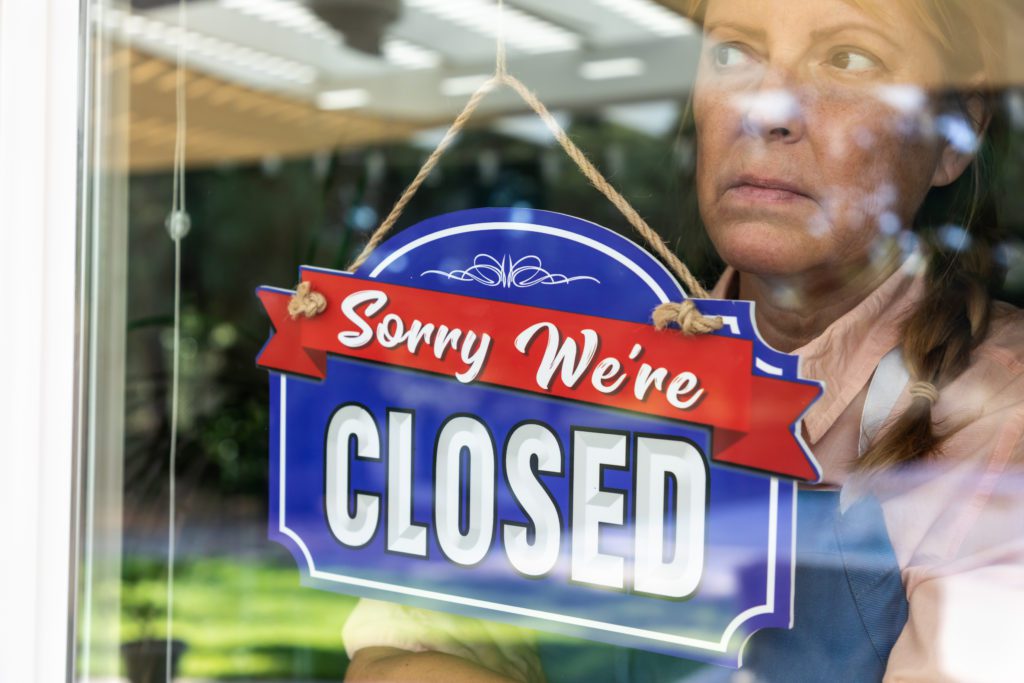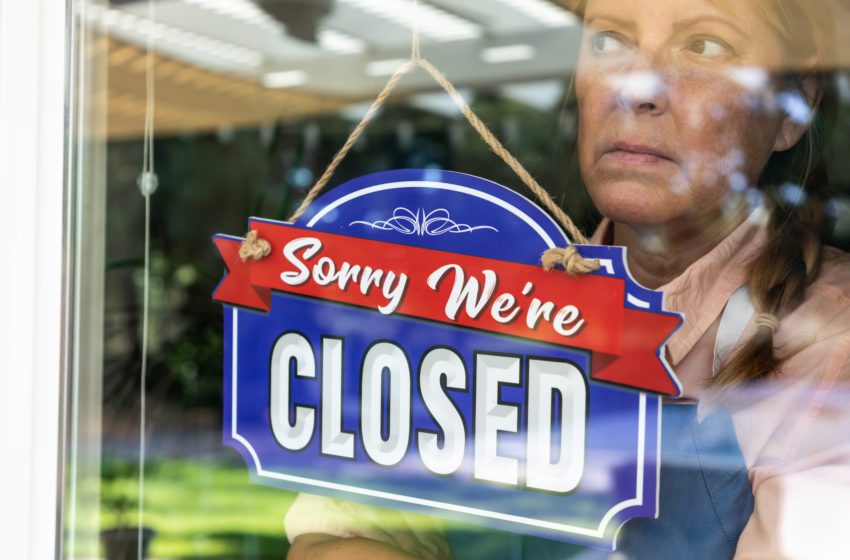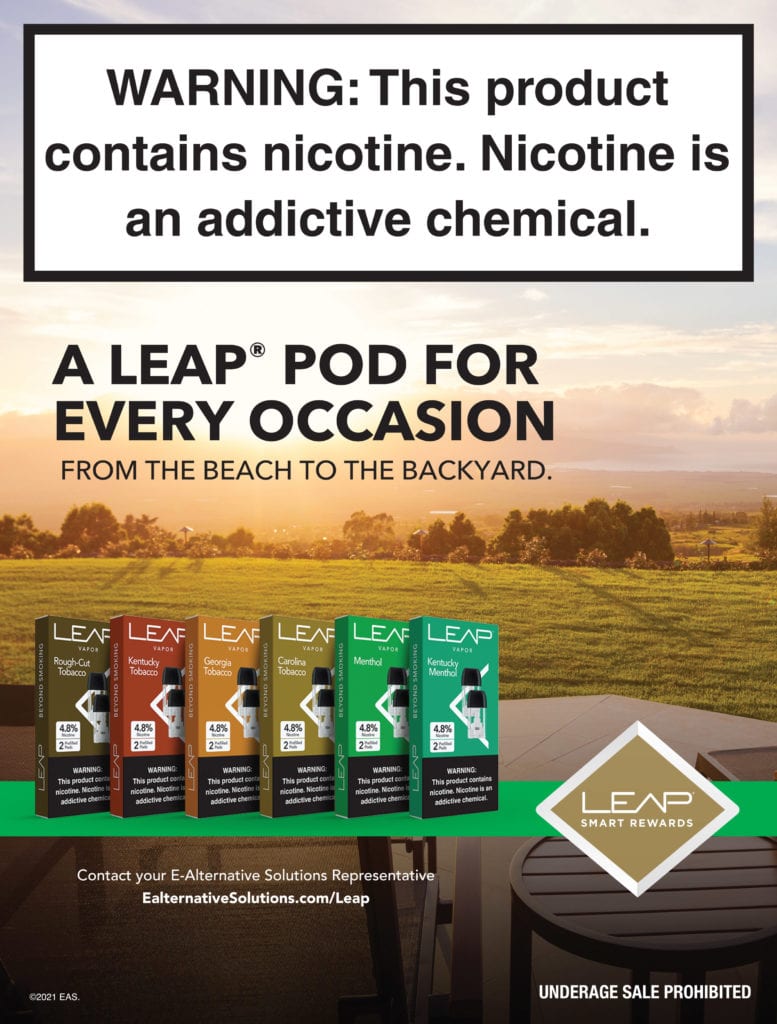
E-liquid manufacturers and retailers are still figuring out how to survive the FDA’s erratic regulatory rules.
By Maria Verven
The vaping industry has been in a downward spiral ever since the U.S. Food and Drug Administration began issuing marketing denial orders (MDOs) for electronic nicotine-delivery system (ENDS) products. When a product with a premarket tobacco product application (PMTA) receives an MDO, it must immediately be pulled from store shelves and removed from the market.
The FDA has issued MDOs for nearly all the approximately 6.7 million PMTAs it received. At press time, the agency was still reviewing an estimated 80,000 products, according to Mitch Zeller, director of the FDA’s Center for Tobacco Products (see “From Chance to Change,” page ?). To date, only Phillip Morris International’s IQOS device and Heatsticks and R.J. Reynolds Vapor Co.’s Vuse Solo, along with two tobacco-flavored pod cartridges, have received marketing granted orders.
The FDA also rescinded or was ordered by a court to stay at least 10 MDOs. This has caused a massive amount of confusion in the industry, especially for vape shop owners and vapor distributors who are struggling to keep only legal products on their store shelves.
Complicating matters, many manufacturers have started using synthetic nicotine in their flavored vaping products and products that had otherwise received an MDO. Synthetic nicotine is in a regulatory void as it isn’t yet being regulated at the federal level, although the FDA has stated it may be considered a component of an e-cigarette, which would put synthetic nicotine under its purview.
Many ENDS business owners say that the industry is also still suffering from the 2019 e-cigarette or vaping use-associated lung injury (EVALI) crisis that was wrongly blamed on nicotine vaping products by the FDA and the U.S. Centers for Disease Control and Prevention. It took more than a year for both government entities to state publicly that the true culprits behind EVALI were illegal THC-based vaping products. Vapor business owners must also combat the never-ending amount of misinformation that is broadcast by anti-vaping groups and the mass media.
Business owners, additionally, have major concerns about the current nicotine tax in President Joe Biden’s Build Back Better Act (as of this writing, the bill was still in the Senate). The current version of the nicotine tax applies only to vaping products and nicotine pouches. The government would tax nicotine bought by manufacturers at the rate of $50.33 per 1,810 mg of nicotine—or 2.8 cents/mg if the bill passes with the tax included.
To get a better understanding of what is happening at the street level in the ENDS industry,Vapor Voice asked a group of manufacturers, retailers and industry leaders about their experience with the FDA and how the agency’s regulatory actions have impacted their businesses.
Vapor Voice: How have the FDA’s marketing denial orders affected your business?

Char Owen, vice president of American Vapor Manufacturer:I think the negative PR around vaping has caused sales to stagnate for most manufacturers and vapor shops. It has also increased the smoking rates for the first time in many years. It’s heartbreaking for us to watch people revert to smoking again.
Unfortunately, most of the industry has changed to synthetic. Over 95 percent of our sales are flavored e-liquid, and with others switching, there was no choice but to switch. We only manufacture open system e-liquids in many flavors, all created from nontobacco-derived nicotine. Our biggest selling products have always been fruit flavors.
We are trying to bring in new products, such as botanicals, that can help our customers with cravings but remove nicotine from the equation. For us, it has always been about harm reduction, nothing more.
Schell Hamel, president of The Vapor Bar:Sales were affected long before the MDO was received. This down spiral began with the media attacking all vapor products as killing people when they clearly knew it was illegal THC products and the entire vapor industry handcuffed to Juul’s reputation.
According to the MDO, all products made in our lab were denied. It seemed as if they used a rubber stamp to deny anything submitted, all without review. I heard them doing similarly across the industry, then approving Vuse.

Jay Oku, business development at Five Pawns:Hundreds if not thousands of customers have been adversely affected from these misguided PMTA, sale and shipping regulations.
We had been developing products to maximize harm reduction for years and were always fascinated with the cleanliness (free of nitrosamines) and the molecular merits of synthetic nicotine. We switched all of our domestic products to synthetic nicotine mid-2020. We are grateful to have maintained our sales volume through 2021.
We saw an increase in overall sales since making the switch to nontobacco-derived nicotine, yet we’ve also seen a longer sales cycle with new accounts due to the number of MDO products that companies are selling through to make room on their shelves. Despite a slight increase in gross sales, net numbers are relatively flat due to the increase in manufacturing and shipping costs in 2021.
Trent Bohl, owner of EZJ Rolling Equipment and Smokey Joes West:It’s logistically added challenges, and the horizon looks like a tough road ahead. While many Juice manufacturers have shifted gears to get into compliance, the shift toward disposables and the future ban of them will be tough for Vape as a whole.
From recent headlines, it seems the FDA doesn’t seem to play well unless you are Big Tobacco.
Do you think there’s a growing black market of products that are no longer legal?
Owen: I absolutely know there is a growing black market. A quick Twitter or Instagram search proves that. So far, those black market dealers have not been targeted by the FDA. Only registered manufacturers have been on their radar.
We need to support and grow the harm reduction industry instead of growing a black market. For harm reduction to be successful, it must be regulated and supported by our federal bodies. Without their support, we risk creating a dangerous environment for consumers. I have a great amount of respect for the U.K. in recognizing this.
Oku: Every day the black market continues to grow. The attrition of retailers, manufacturers and distributors is being caused by excessive rogue state taxation, the PACT Act that complicates accounting and reporting, and misguided government overreach that results in flavor bans.

Numerous disposable manufacturers are selling mass quantities of vapor products through back doors. Some of these black market brands push immature non-lab-produced concoctions with cartoons on their labels. These regulations push people who benefit from tobacco harm reduction technology to inferior products and even worse, back to cigarettes.
Bohl: I have stores in New Mexico, and in Mexico, which outright banned vapes. The black market is huge in Mexico; any low-dollar mercado or corner OXXO seems to have them. The USA will follow suit I suspect, given the demand for vape. When one reflects on how the black market vape cannabis carts disrupted the industry and damaged lives and harmed the reputation of the industry, it’s just going to be that times 10.
What has been your experience with FDA inspections?
Owen: Personally, I had a good inspector, but it truly is the luck of the draw, and it hasn’t been the case for everyone. In my case, he was only there to find proof of manufacturing of any MDO products, and his paperwork was written to support that. My batching logs were not reviewed nor my manufacturing practices.
One member had their inspector show up at 7 p.m. on Halloween. Another member had the FDA come to her home and photograph her home office instead of her manufacturing establishment. He then took photographs of her neighbor’s home. There were instances where the inspector pressured staff when owners or managers were not present to make MDO’d products and then sent warning letters.
The American Vapor Manufacturer is usually involved in a warning letter meeting every couple of weeks. We even help nonmembers with those. It’s a very tricky process, and it’s good to have someone there who can be objective and help both the FDA and the manufacturer resolve the matter.

Bohl: I haven’t seen them from this industry perspective, but from the agricultural side and medical marijuana side, one thought comes to mind: brutal for some, not bad for others.
What ultimately will result from these MDOs?
Owen: What the FDA did was extremely arbitrary and capricious. I feel that anyone who can afford to challenge them in court will be able to prove that. My concern is for all the small businesses that cannot afford to do that.
If something doesn’t change, you will see manufacturers close and smoking rates rise. In almost all industries except vaping, small business is celebrated. This is a shame because those small shops are the ones with the hearts for harm reduction.
To lose those small businesses would be a devastating blow to the effort in moving this country to becoming smoke-free.
Oku: I am optimistic that the FDA will reconsider or rescind MDOs and revise their outdated ambiguous and debilitatingly cost-prohibitive PMTA process.
Since 2016, FDA action against the industry has resulted in warning letters and fines to those breaking the rules, yet there’s little to no enforcement. Many MDO products are being sold since there was an enormous glut of inventory in preparation for the September 2021 ruling.
There will invariably be an increase in synthetic nicotine products until those, too, are regulated out of the market.
Congress has been slipping anti-vaping bills into much larger spending packages, such as during the 2019 holiday break deep in the Omnibus Spending Bill. These bills implement devastating regulations that put our industry and the health of our customers in jeopardy.
Bohl: The goal stated by the FDA 15 years back was the end of combustibles. Vape could have helped that. I am buying a decent stock, fearing the day one more freedom is taken away in the name of safety.
The original “Vaping Vamp,” Maria Verven owns Verve Communications, a PR and marketing firm specializing in the vapor industry.


